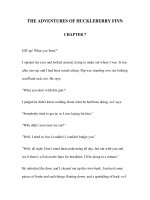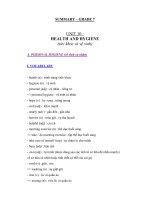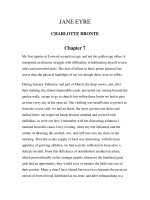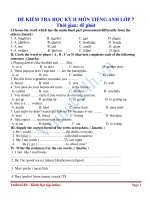CHAPTER 7 TO 10 pps
Bạn đang xem bản rút gọn của tài liệu. Xem và tải ngay bản đầy đủ của tài liệu tại đây (74.26 KB, 8 trang )
GRAMMAR: CHAPTER 7
FUTURE TIME CLAUSES and IF clauses
Definition:
• A clause is a group of words that has a subject and a verb.
• A main clause can stand alone as a complete sentence.
• A dependent clause cannot stand alone and must be used with a main clause.
FUTURE TIME CLAUSES:
Future time clauses are dependent time clauses. They begin with words such as BEFORE,
WHEN, WHILE, and AFTER.
A future time clause can come before or after the main clause. If the future time clause
comes first, it is separated from the main clause by a comma.
Use WILL or BE GOING TO in the main clause, and the simple present in future time
clause.
USING FUTURE TIME CLAUSES FOR EVENTS IN SEQUENCE
Future Events in Sequence: Future time clauses show the time relationship between two
events or situations in a sentence. When a time clause begins with WHEN or AFTER, the event
in the time clause happens first. When a time clause begins with BEFORE, the event in the
time clause happens second.
For example
First Event Second Event
When I get home, I’ll call you.
After they get married, They’re going to move to California.
I’m going to water the plants before I go on vacation.
EXPRESSING FUTURE POSSIBILITY WITH “IF” CLAUSE
1. Cause-and-effect Relationship: The IF clause introduces a possible situation (the cause)
and the main clause talks about the possible result (the effect) of that situation.
If clause (Cause) Main clause (Effect)
If she gets that job, her salary will increase.
If you press the red button, the elevator will stop.
2. Expressing Advice, Warnings, Promises, and Predictions:
Giving advice: If you rest now, you’ll feel better later.
Giving a warning: If you don’t tell the truth, you’re going to be sorry.
Making a promise: If you elect me, I won’t raise taxes.
Making a prediction: If he moves to the city, he won’t be happy.
3. Possibility vs. Certainty: Use an IF clause if you think something is possible but you are
not sure it will happen. Use a future time clause with WHEN if you are certain something
will happen.
If clause (possible) Future time clause (Certain)
If it goes on sale, I’ll buy it. When it goes on sale, I’ll buy it.
I’ll visit the Taj Mahah if I go to India. I’ll visit the Taj Mahah when I go to India.
GRAMMAR: CHAPTER 8
MODALS OF ABILITY AND POSSIBILITY
• MODALS OF ABILITY: CAN and COULD, BE ABLE TO
Present Ability with CAN, BE ABLE TO:
CAN and BE ABLE TO is used to talk about an ability in the present. CAN is more commonly
used than BE ABLE TO.
For example: 1. The baby can walk, but she can’t talk yet.
2. Strong winds can cause a lot of damage.
3. He is able to speak French and Arabic.
Future Ability with BE ABLE TO and CAN:
+ Use WILL BE ABLE TO to talk about a skill or other ability that you don’t have yet, but you
will have in the future. DO NOT use CAN to describe an ability that you will have only in the
future.
For example: 1. After I complete this class, I’ll be able to type 60 words a minute.
2. I will be able to see better after I get new glasses.
+ Use WILL BE ABLE TO and CAN to express ability that relates to decisions and
arrangements for the future.
For example: 1. She’ll be able to / can meet you at the airport at 3:00.
2. I’m busy now, but I’ll be able to/ can help you in 10 minutes.
Past Ability with COULD and BE ABLE TO:
+ Use COULD or WAS/WERE ABLE TO to talk about an ability that existed for a long period
of time in the past.
For example:
1. When I was young, I was be able to / could eat dessert every night and I didn’t gain weight.
+ In affirmative statements with action verbs, do not use COULD to talk about an ability
related to a single event. Use only WAS/WERE ABLE TO.
For example: Single event with action verb (Affirmative)
Yesterday I was able to finish my homework quickly. (CORRECT)
* Yesterday I could finish my homework quickly. (INCORRECT)
+ In affirmative statements with certain stative verbs such as SEE, HEAR, FEEL, TASTE,
UNDERSTAND, and REMEMBER, use COULD or WERE/WAS BE ABLE TO to talk about
ability related to a single event in the past.
For example: Single event with Stative verb (Affirmative)
Last night the sky was clear and we were able to/could see for miles.
+ In negative statements, use COULDN’T or WASN’T/WEREN’T ABLE TO for both ability
during single events and ability over a long period of time.
For example: Single event (Negative)
Yesterday I wasn’t able to/couldn’t finish my homework quickly.
Long period of Time
When I was younger, I wasn’t able to/couldn’t finish my homework quickly.
• FUTURE POSSIBILITY : COULD, MIGHT and MAY
+ COULD, MIGHT, MAY express possibility about the future. COULD and MIGHT
sometimes express more uncertainty than MAY.
For example: 1. I could get an A or a B in the course. It depends on my final paper.
2. I may take history next semester. It seems like a good idea.
+ MIGHT/MAY (NOT) + BE ABLE TO talks about future possibility and future ability.
For example: 1. It’s already April, but I might be able to go skiing one more time.
2. If I learn to speak Portuguese, I may be able to get a job in Brazil.
+ Use WILL in YES/NO questions about future possibility. You can use MIGHT but it will
sound overly formal. Do not use MAY.
For example: 1. Will he come home soon?
2. Might he come home soon? (* May he come home soon? – INCORRECT)
+ Use WILL when you are certain about something. If you are not certain, you can weaken
WILL by adding the adverbs PROBABLY, MAYBE, and PERHAPS.
Certain Not certain
They’ll move in the summer. They’ll probably move in the summer.
She’ll find a new job. Maybe she’ll find a new job.
GRAMMAR: CHAPTER 9
MODALS AND PHRASES OF REQUEST, PERMISSION,
DESIRE, AND PREFERENCE
A - MODALS AND PHRASES OF REQUEST
• MAKING REQUESTS:
+ Use CAN, COULD, WILL, and WOULD to make requests. CAN and WILL are less formal
than COULD and WOULD. We usually use CAN and WILL in informal conversations with
friends and family. We use COULD and WOULD to make polite requests in formal situations
when we speak to strangers or to people in authority.
Less formal More formal
To a friend: Can you tell me the time? To a stranger: Could you tell me the time?
Mother to Child: Will you be quiet? To a Boss: Would you look at my report?
+ Add PLEASE to a request to make it more polite.
Can you tell me the time, please? Would you please look over my report?
• AGREEING TO and REFUSING REQUESTS:
+ Use WILL and CAN to agree to requests. Do not use WOULD or COULD. We generally use
CAN’T to refuse a request. WON’T is used for strong refusals, and sounds impolite.
Agreeing to a Request Refusing a request
A: Will you help me for a minute? A: Can you help me decorate for the party?
B: Yes, I will. B: Sorry. I can’t right now.
A: Could you spell your name for me? A: Holly, will you clean up this room?
B: Yes, I can. It’s C-L-A-R-K-E. B: No, I won’t.
+ We often use expressions such as OK, SURE, or CERTAINLY when agreeing to a request.
A: Will you help me for a minute?
B: OK.
A: Could you spell your name for me?
B: SURE. It’s C-L-A-R-K-E.
+ We often say I’M SORRY and give a reason in order to make our refusal more polite.
A: Can you help me decorate for the party?
B: I’m sorry, but I can’t right now. I have a doctor’s appointment.
B - MODALS OF PREMISSION:
• ASKING FOR PREMISSION:
+ Use CAN, COULD, and MAY to ask for premission. CAN and COULD are less formal than
MAY. We usually use MAY in formal situations when we speak to strangers or to people in
authority. You can use PLEASE to make your request more polite.
Less formal
Child to Parent: Can I go outside and play now?
Friend to Friend: Could I borrow your pen for a minute?
More formal
Business Call: A: May I speak to Ms. Jones, please?
B: Certainly. May I ask who’s calling?
+ MAY is used in announcements and signs or other printed materials.
Announcement: Flight 26 has arrived. Passengers may proceed to Gate 2B for boarding.
Sign: Visitors may not park in numbered spaces.
• GIVING AND REFUSING PERMISSION:
+ Use MAY/MAY NOT or CAN/CAN’T to give or refuse permission. Don’t use COULD.
Giving Permission
A: Could I hand in my homework tomorrow?
B: Yes, you may. Just put it on my desk.
Refusing Permission
A: Could I hand in my homework tomorrow?
B: No, you can’t. It’s due today.
+ Instead of answering with CAN or MAY, we often use expressions such as SURE, GO
AHEAD, or CERTAINLY when giving permission.
A: Can I use the computer now?
B: Sure. I’m finished with it. (Go right ahead)
+ We often say I’M SORRY and give a reason in order to make our refusal more polite.
A: Could I hand in my homework tomorrow?
B: I’m sorry, but you can’t. It’s due today.
C – WOULD LIKE, WOULD PREFER, WOULD RATHER:
• STATING DESIRES AND MAKING REQUESTS with WOULD LIKE
+ WOULD LIKE (= want) is often used to talk about desires.
I’d like to go to China next year. (I want to go to China next year.)
+ WOULD LIKE is more polite than WANT in making requests. Add PLEASE to make the
request even more polite.
I’d like the check, please. * I want the check. (not polite)
• MAKING OFFERS with WOULD LIKE
+ Use WOULD LIKE in a question to make a polite offer.
A: Would you like some coffee?
B: Yes, please. With milk and sugar.
+ Be careful not to confuse WOULD LIKE and LIKE.
Would like (to make an Offer) LIKE (to ask about LIKES and DISLIKES)
A: Would you like some tea? A: Do you like coffee?
B: Yes, please. B: Yes, I do. I drink it every morning.
• ACCEPTING AND REFUSING OFFERS with THANK YOU
Use THANK YOU to accept and refuse offers. We often give a reason to make our refusal more
polite.
Accepting an Offer Refusing an Offer
A: Would you like a seat? A: Would you like a seat?
B: Yes, thank you. B: No, thanks. I’m getting off at the next stop.
• STATING PREFERENCES with WOULD LIKE, WOULD PREFER, WOULD RATHER
+ Use WOULD LIKE, WOULD PREFER, WOULD RATHER to ask about state preferences.
LIKE to
A: Would you PREFER to walk home or take a bus?
RATHER
B: I’d like to walk.
C: I’d rather take the bus. It’s too far to walk.
+ Use WOULD RATHER with THAN to compare two actions.
I’d rather walk than take the bus.
I’d rather play basketball than play football.
GRAMMAR: CHAPTER 10
MODALS OF ADVICE, NECESSITY, and PROHIBITION
MODALS AND PHRASAL MODALS OF ADVICE
Weak and Strong advice:
+ Use COULD, MIGHT, SHOULD (NOT), OUGHT TO, HAD BETTER (NOT), HAVE TO,
HAVE GOT TO, MUST to give advice, suggestions, and warnings.
Weak could, might You could buy her flowers.
should (not), ought to You should ask her what she wants.
had better (not) You’d better buy something before it’s too late.
Strong have to, have got to, must You have to buy her that new book.
Suggestions with COULD, MIGHT:
+ Both COULD, MIGHT are used to make casual suggestions, especially when there is more than
one choice.
Ex: If you want to get to know him, you might invite him for coffee after class, or you could call
him.
Advice with SHOULD, OUGHT:
+ Use SHOULD (NOT), OUGHT TO to give advice. SHOULD (NOT) is more common than
OUGHT TO.
Ex: You should get married in June, when the weather is warm.
You ought to look for a new job.
+ Use SHOULD (NOT), OUGHT TO to express a personal opinion about something.
Ex: People shouldn’t drive when they’re tired.
The President ought to do more for the environment.
+ Use words such as I THINK, MAYBE, PERHAPS to soften your advice or opinion.
Ex: I think the President ought to do more for the environment.
Maybe you should get married in June.
Warning with HAD BETTER:
+ HAD BETTER (NOT) is stronger than SHOULD, OUGHT TO. It’s used to give advice with a
warning about possible bad consequences. Use words such as I THINK, MAYBE, PERHAPS to
soften the meaning.
Ex: You’d better study for the test. If you don’t, you’ll fail.
You’d better not to make so many personal phone calls at work, or you’ll lose your job.
Strong Advice with HAVE TO, HAVE GOT TO, MUST:
+ HAVE TO, HAVE GOT TO, MUST are used to give strong advice and suggest that the situation
is serious or urgent.
Ex: Your cough sounds terrible. You have to/have got to/must see a doctor immediately.
+ HAVE TO, HAVE GOT TO, MUST are also used to show that the speaker has a strong opinion
about something, even though the situation is not serious.
Ex: You have to/have got to/must try that new restaurant. I ate there yesterday and the food is
great!
MODALS OF NECESSITY and PROHIBITION:
Necessity:
+ SHOULD, OUGHT TO, HAVE TO, HAVE GOT TO, MUST express necessity. MUST
expresses the STRONGEST necessity and is used in formal or more serious situations. We often
use SHOULD, OUGHT TO, HAVE TO, HAVE GOT TO in conversation to avoid sounding too
formal.
Ex: Students should study their notes before the exam.
I have to hurry. I’m going to be late!
We’ve got to send out the invitations today. The party is next week.
+ Use MUST to express rules, laws, and requirements, especially in written documents.
Ex: Bicyclists must obey all traffic lights in the city.
All couples must apply for a marriage license in person.
+ SHOULD, HAVE (GOT) TO are used instead of MUST to talk about rules and laws in less
formal English.
Ex: The manual says that bicyclists should obey all traffic lights in the city.
I found out that we have to apply for a marriage license in person.
Lack of Necessity vs. Prohibition:
+ DON’T/DOESN’T HAVE TO means that something is not necessary – there is a choice of
whether to do it or not. MUST NOT means that something is prohibited (not allowed). There is no
choice involved.
Don’t/Doesn’t HAVE TO (Not necessary)
Your children don’t have to take these vitamins. If they eat a healthy diet, they’ll be fine.
Must not (Prohibited)
Your children must not take these vitamins. They are for adults only.









